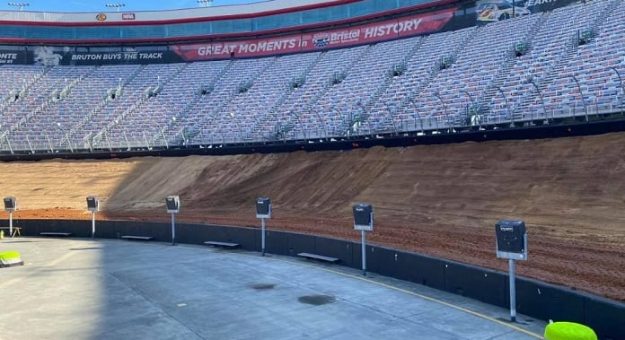BRISTOL, Tenn. – NASCAR officials surprised fans across the country Wednesday afternoon with the revelation that the upcoming dirt-track weekend at Bristol Motor Speedway will utilize passing points as well as heat race finishes to set the starting lineups.
The news came as part of the announcement of the remaining format and procedural details for both the NASCAR Cup Series Food City Dirt Race and the NASCAR Camping World Truck Series Pinty’s Dirt Truck Race.
Practice for both the Cup Series and Truck Series will take place Friday, followed by four 15-lap heat races on Saturday to set the field for both divisions’ feature events. Only green-flag laps will count in each heat race.
The lineup for those heats will be determined by a random pill draw, with the draw going in order of current car owner points, while the starting lineup for each feature will be set by a formula that accounts for finishing position and positions gained during each heat.
Drivers winning their respective heats earn 10 points, dropping by one point per position back to one point for 10th place. Drivers earn one additional passing point for each position gained in their heat, with no points deductions or “negative points” for those losing spots in their heats.
The heat race points earned will only be used to calculate the starting lineup and have no effect on the championship standings. Ties in combined point totals will be broken by the owner point standings.
It was announced previously that heat races would be featured during Bristol’s dirt weekend, similar to prior Truck Series events at Ohio’s Eldora Speedway, but the addition of passing points is a fresh wrinkle that pays homage to years of dirt-track tradition at grassroots facilities across the country.
“When we started figuring out how we were going to do the preliminary races, we obviously took a look at what we had historically done in Eldora with the Truck Series race there, kind of took some elements of that, things that worked. But really what we wanted to do for this event was kind of get back to the roots of dirt track racing, and incorporate some of those elements that are kind of have been ingrained in dirt track racing for a while,” NASCAR senior vice president of competition Scott Miller told reporters on a media conference call.
“One of the biggest things is whittling the field down to the main event and setting the starting lineup via heat races, then with the element of passing points that has been a part of dirt track racing for a while, actually creates a lot of excitement and mixes things up,” he added. “We just wanted to add some elements and setting the lineup for the feature that were from the roots of dirt track racing. That’s where we landed.”
Tire changes, vehicle work and fueling can only be conducted during the stage breaks. Exceptions will be made for vehicles involved in incidents during the event.
Pit stops will be held under a controlled pit format, with drivers not losing positions based on how they come off pit road and instead lining up in the order that they finished the preceding stage in. Drivers electing not to pit line up ahead of those who choose to pit.
“We toyed with the idea of whether we could have pit stops like we normally see every week,” admitted Miller. “Honestly, with dirt cars on a dirty concrete pit road, having pit crews trying to run out there and do all of the work, I just don’t think that would have been in our best interest, especially the first time around. We can look at how the facility looks and what pit road looks like after we do it once, but we decided that there was really no way that we could have live pit stops as we know them.
“There will be a set time, much like Eldora, when the cars get in their pit boxes to do their work. They will be allowed to do all of the normal things at kind of a leisurely pace, then when that time expires and we get everybody rolling again, we will resume the lineup that was frozen at the end of the stage,” Miller added. “If any cars elected not to pit, they will still be on the race track and will start ahead of the cars that did elect to pit.”
Stages one and two of the Cup Series 250-lapper will end at laps 75 and 150, respectively, while the stage breaks for the 150-lap Truck Series race will be on laps 40 and 90.
The choose rule, used at most oval tracks on the NASCAR schedule, will not be in effect for the Bristol Dirt Weekend. The overtime rules, free pass and wave around procedures will be in effect for both the Truck Series and the Cup Series, with no overtime in the heat races.
Set for Sunday, March 28, the Food City Dirt Race will be the first race on a dirt surface for NASCAR’s premier series since 1970.
The Truck Series added dirt racing to its repertoire in 2013 with a race at Ohio’s Eldora Speedway, racing there for seven consecutive years, but this will be the division’s debut on Bristol’s .533-mile concrete layout with dirt overlaid on the track.
If things go well, could Bristol’s dirt weekend become an annual event?
“If we have an event that is as fantastic as we all are hoping that it will be, which we all believe that it will be, then we will figure out a way to make it continue on,” tipped Miller. “If we have problems, we would certainly have to look at it for what the future of it is.
“But I do think it’s pretty safe to say that if we have an overwhelmingly successful event, we will figure out a way to carry on with it (in the future).”
